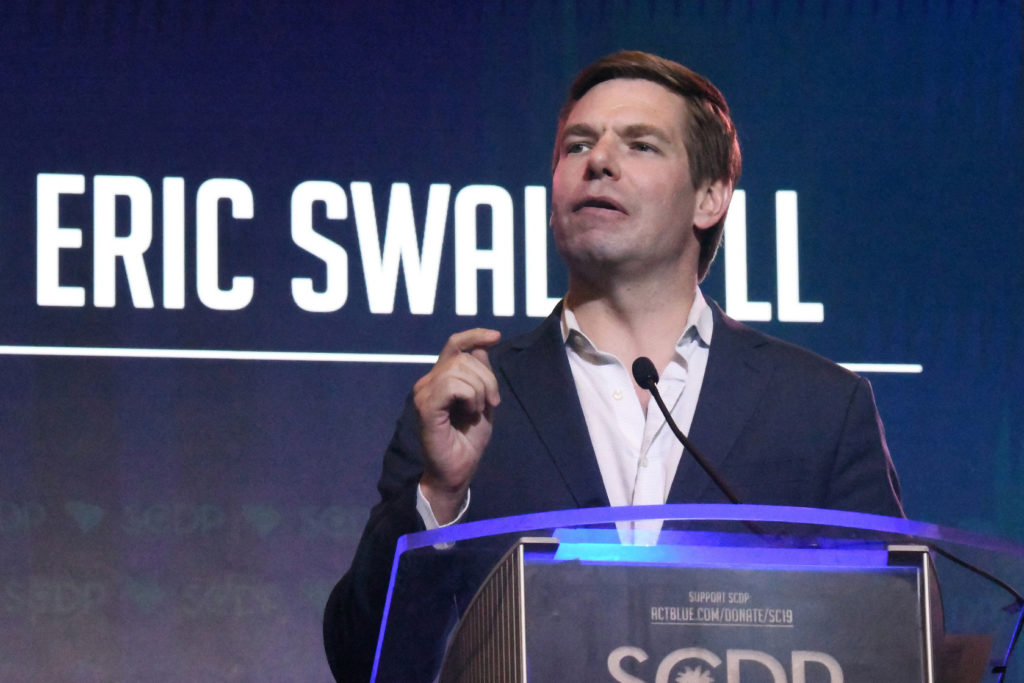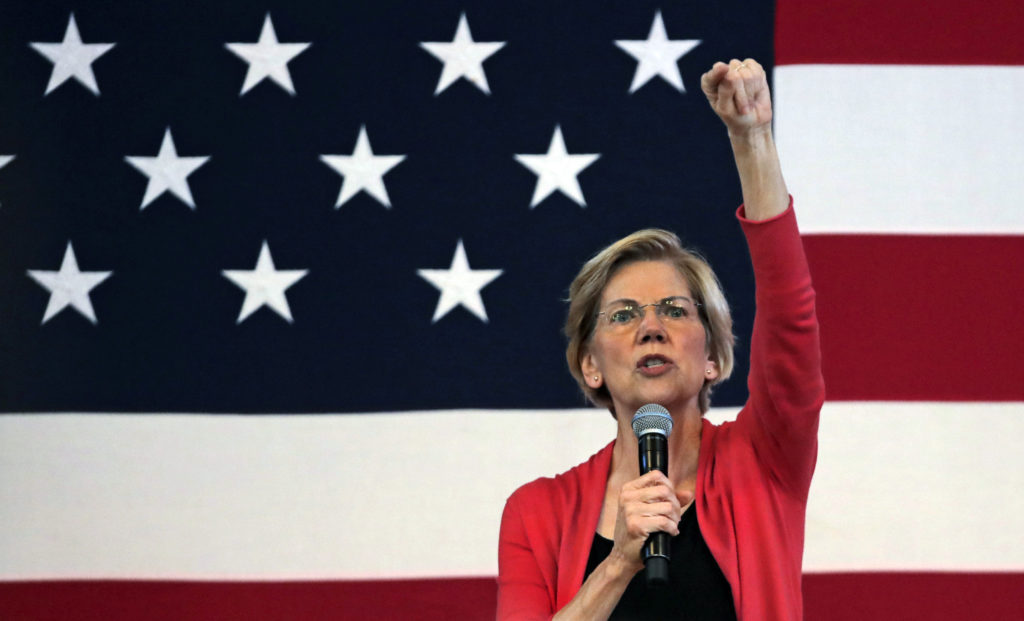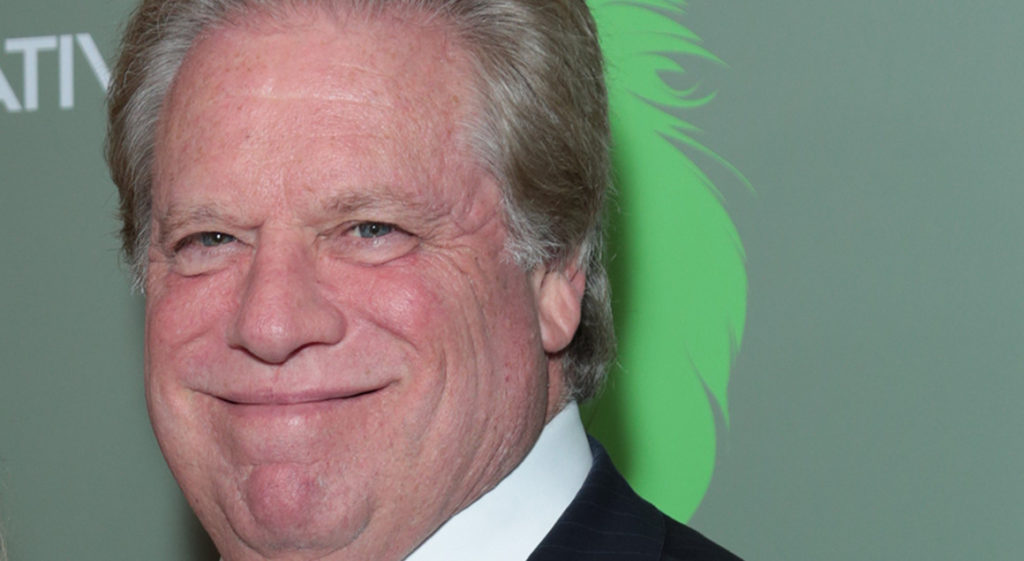U.S. Rep. Eric Swalwell ends presidential bid, will seek reelection

Rep. Eric Swalwell on Monday became the first candidate in the crowded 2020 Democratic presidential primary to exit the campaign, saying he would run for reelection to his California congressional seat next year. Swalwell, 38, announced his exit in his home district, describing his decision as “the beginning of an opportunity in Congress with a new perspective” influenced by his 3-month-long presidential bid. The four-term congressman’s White House effort never progressed significantly with voters, a fact Swalwell acknowledged on Monday in saying that “polls have had their way” in determining his viability. He had signaled before departing the race that he would consider bowing out if he was in danger of missing the cutoff for the next nationally televised Democratic debate, which is based on separate polling and donor qualifications. Montana Gov. Steve Bullock missed the threshold for last month’s debate but was ahead of Swalwell in the competition for this month’s televised Democratic faceoff. Asked about whether other candidates with similarly lackluster success so far in the packed Democratic primary should also consider dropping out, Swalwell demurred, describing the abandonment of a campaign as “really a personal decision.” He also declined to indicate which of his onetime presidential rivals he might endorse in the primary and said he had not planned to seek the presidency as “a vanity project” or “to write a book.” As Swalwell prepares to seek another term in Congress, he said that he would not “take anything for granted.” Indeed, he already has a challenger in his liberal-leaning district: Democrat Aisha Wahab, a city councilwoman in Hayward. But Swalwell is viewed as a rising star in the House Democratic majority, with Speaker Nancy Pelosi lauding him during an appearance in San Francisco on Monday. “He had a message of national security and gun safety that he wanted to convey to the country and he did that,” Pelosi told reporters. By Elana Schor Associated Press. Associated Press writer Samantha Maldonado in San Francisco contributed to this report. Republished with the permission of the Associated Press.
Elizabeth Warren raises $19.1 million, topping Bernie Sanders in new fundraising

Elizabeth Warren raised $19.1 million in the second quarter, her campaign said Monday, cementing her status in the top tier of Democratic presidential contenders and surpassing Bernie Sanders, her main liberal rival. The strong showing leaves the Massachusetts senator behind only Pete Buttigieg, the South Bend, Indiana, mayor who reported nearly $25 million, and former Vice President Joe Biden, who has tallied $21.5 million since his candidacy began in late April. Perhaps most notably, Warren raised more money than Sanders, who is also vying for liberal voters and is the only other candidate who has joined her in swearing off high-dollar fundraisers. The strong showing signals the grip Warren is gaining over the party’s progressive base. Sanders easily won over these voters during the 2016 presidential primary as the sole liberal alternative to Hillary Clinton. But he faces more competition during his second run, and Warren’s steady stream of ambitious policy plans may come at his expense. “To sum it up: We raised more money than any other 100 percent grassroots-funded campaign,” said Roger Lau, Warren’s campaign manager, said in a glancing reference to Sanders. “That’s big.” Warren more than tripled the $6 million she raised in the first three months of 2019 , when she silenced some skeptics of her long-term fundraising viability following her decision to rely on grassroots rather than high-dollar donations. The campaign’s $19.1 million came from more than 384,000 contributors giving more than 683,000 donations. That’s less than the nearly 1 million individual donations Sanders’ campaign reported, but comparable with the 725,000 online donations that President Donald Trump’s reelection campaign reported during the second quarter. More than 80 percent of Warren’s second-quarter donors were first-time contributors. Warren’s extensive organizing apparatus, particularly in early voting primary states, remains both a formidable asset — and a significant cost — as the campaign prepares to report $19.7 million in cash on hand. Her operation counts more than 300 paid staff members, 60 percent of whom are in the four early voting states of Iowa, New Hampshire, South Carolina and Nevada, according to the campaign. While a staffing footprint of that size is likely to spark questions about Warren’s high spending rate among some of her presidential rivals, her team has already underlined its confidence that the campaign will have enough resources for the long term. “Overall, the Warren operation has a six-figure number of people who own a piece of the campaign and an eight-figure amount of money to go execute the plan. So, game on,” Warren adviser Joe Rospars tweeted after her first quarter fundraising tally emerged. Beyond Sanders, Warren’s success also could pose a threat to California Sen. Kamala Harris, whose $12 million second quarter fundraising got a major boost in the final days of last month from her performance in the first Democratic debate. Both Warren and Harris hold a natural appeal to Democratic voters seeking to select a female nominee to go up against Trump, and Warren is seeking to make headway with black women even as Harris seeks a foothold as the primary’s lone black female candidate. After a campaign event in New Hampshire on Monday, Warren said that grassroots support is “going to be our comparative advantage come 2020.”“And even more importantly, that’s going to be the momentum to get real change come January 2021,” she said. As Warren rises in the fundraising chase, she has also gained strength in some Democratic primary polls conducted since the first round of debates. While Biden appears to remain the front-runner, his margin over the pack of candidates that includes Warren, Sanders and Harris has narrowed. A national poll released last week by Quinnipiac University also found Warren increasing her standing among voters as the candidate with superior policy proposals. Warren’s energetic output of policy proposals has helped her push past a rocky start in the primary. That fast pace isn’t likely to change as the Democratic campaign nears an expected winnowing from about two dozen candidates. This week alone, Warren is scheduled to hold a town hall in Milwaukee after joining a half-dozen other Democratic presidential hopefuls at a gathering hosted by the League of United Latin American Citizens. She’ll then head to Philadelphia for Netroots Nation, an annual conference for progressive activists. “In the weeks and months ahead, we’ll keep growing our movement across the country and Elizabeth will keep rolling out new plans to level the playing field for working people,” Lau wrote in an email to supporters. Warren was already a guaranteed presence in this fall’s Democratic primary debates, which require at least 130,000 donors as well as minimum polling performance, according to rules set by the Democratic National Committee. She’ll likely be joined on that stage in the fall by a rival whose showing she praised after last month’s first debate: former Housing Secretary Julián Castro, who reported on Monday that he had met the higher donor threshold needed to qualify. Associated Press writer Hunter Woodall contributed to this report from Peterborough, New Hampshire. By Elana Schor Associated Press Republished with the permission of the Associated Press.
Potential tolls for Interstate 10 Mobile River Bridge spark opposition

City officials in Mobile say they’re confident the state of Alabama will reduce toll amounts for the proposed Interstate 10 Mobile River Bridge and Bayway project. The Alabama Department of Transportation is considering a $3 to $6 one-way toll to provide the money necessary to pay for the massive project. The plan under consideration would grant a discount to frequent drivers, Al.com reported. If there must be a toll, “our goal is to make it the lowest possible for citizens of Mobile,” said George Talbot, a spokesman for Mobile Mayor Sandy Stimpson. Talbot added that city officials are also committed to establishing at least one free route for local drivers. Other local politicians have made similar statements in recent months. State lawmakers and local officials have said they support the bridge project but were hopeful the Alabama Department of Transportation would lower tolls on local users. Opposition to any kind of tolls has risen on social media. The Block the Mobile Bayway Toll Facebook group has amassed more than 18,000 followers, and a large portion of them adamantly oppose tolls of any kind. The project involves building a six-lane cable stay bridge above the Mobile River. It would be 2.5 miles (4 kilometers) long. The bridge would be among the tallest in North America, and only 5 feet (1.5 meters) shorter than the 220-foot (67-meter) height of the Golden Gate Bridge in northern California. The entire Bayway would also be replaced, rather than merely widened as originally projected. The new Bayway would be a 7.5-mile (12.1-kilometer), eight-lane span crossing Mobile Bay, elevated to a height that would be above a 100-year storm surge level. Republished with the permission of the Associated Press.
Lt. Governor Will Ainsworth’s appointments: Healthcare related (January 2019 – July 2019)

We are please to present Lt. Governor Will Ainsworth’s healthcare related appointments from January to July 2019. Additional appointments in judicial and criminal justice, education and child welfare, IT/infrastructure and agriculture and natural resources are to follow. Steering Committee on Women’s Health (Made February 04) · Dr. Alicia Ewing Medicaid, Joint Committee (Made February 20) · Senator Jim McClendon · Senator Greg Reed Alabama Head and Spinal Cord Injury Trust Fund Advisory (Made March 04) · Senator Tom Butler Alabama Family Practice Rural Health Board (Made May 08) · Senator Greg Reed
Lt. Governor Will Ainsworth’s appointments: Education and Child Welfare related (January 2019 – July 2019)

We are please to present Lt. Governor Will Ainsworth’s education and child welfare related appointments from January to July. Additional appointments in judicial and criminal justice, healthcare, IT/infrastructure and agriculture and natural resources are to follow. Information on open board positions is on the appointments webpage. Prepaid Affordable College Tuition (PACT Board) (Made February 27) · Senator Donnie Chesteen · Senator Garlan Gudger Alabama Public Charter School Commission (Made March 04) · Dr. Mark W.C. Martin · Allison Haygood Children First Trust Fund Board, Join Legislative Oversight Committee (Made March 18) · Senator Donnie Chesteen · Senator Tim Melson · Senator Arthur Orr · Senator Clay Scofield · Senator Rodger Smitherman · Senator Larry Stutts Alcoholic Beverage Control Board, Advisory Board for the Restriction of Youth (Made April 03) · Senator Dan Roberts Alabama Interagency Autism Coordinating Council (Made April 03) · Senator Cam Ward Children in State Care, Joint Legislative Oversight Committee (Made April 03) · Senator Will Barefoot · Senator Linda Madison-Coleman · Senator Malika Fortier-Sanders Arts Education License Plate Advisory Committee (Made April 30) · Jane Kohl Alabama ACES Trust Fund Board (College Savings/529 Program) (Made July 19) · Susan Tully
Rauf Bolden: Overtourism in Orange Beach

Overtourism is like water, proportionately increasing with the lanes you give it. The impact of overtourism’s traffic in Orange Beach was never anticipated. Is it too much to ask City Council, Community Development, and the Planning Commission to publish their 2030 Plan for growth, replacing the old Horizon 2020 Plan? “In short, overtourism occurs when there are too many visitors to a particular destination. ‘Too many’ is a subjective term, of course, but it is defined in each destination by local residents, hosts, business owners and tourists. When rent prices push out local tenants to make way for vacation rentals, that is overtourism. When narrow roads become jammed with tourist vehicles – these are all signs of overtourism,” according to a report in Responsible Travel. Where is the off ramp for Orange Beach? Continually hiding behind the rhetoric, “They can build [condos] by right,” arguing we cannot stop the growth, because Orange Beach will face litigation. This is the city’s defensive shield, blaming the debilitating traffic from construction-driven growth and unplanned infrastructure on zoning rights. Archaic zoning laws, passed decades ago, place Orange Beach in legal jeopardy if they restrict zoning on grandfathered properties, enabling overtourism to thrive in a booming economy. In 2008 the Taxable Lodging Rentals were $4,268,949 versus the Taxable Lodging Rentals of $23,091,793 in 2018, according to a report from the Citizen and Visitors Bureau in an email. This is an impressive increase in lodging rentals of 540 percent over ten years, obviously generating substantial tax revenues for the city. I do not expect to see a revolt in Orange Beach with protesters shouting, “Tourist go home,” as happened on the streets of Barcelona, Venice and Dubrovnik. We need a bipartisan community plan for sustainable tourism, not a knee jerk reaction where local officials increase lodging taxes, and initiate road widening in a desperate attempt to quell tourist traffic. Does Orange Beach need a comprehensive plan, looking forward to 2030, defining paths for community wellness, infrastructure, schools, churches, businesses, tourism, and the environment? “The old plan [for 2020] was done during [Mayor] Russo’s era [2006]. Should be revisited,” said Lucy Hazebrook, a resident of Orange Beach in an email. “The whole county needs a comprehensive plan for growth. Both Orange Beach and Gulf Shores desperately need a plan for growth. Robert Craft I trust. Terrible Tony [Kennon]? No,” said Brenda Hancock, a resident of Baldwin County since 1961 in an email. The travel industry dictates growth, thinking less about the impact. Is this a key issue? Orange Beach is not a tourist destination in the classical sense of visiting museums, seeing historic artifacts, or wandering through a medieval castle. We are a family destination with a beach, and our primary product is family safety. Keeping visitors safe whether in the water, on the beach, or dining out is the city’s anthem. In today’s world where gun violence litters every news cycle, safety is a primary concern for parents choosing a destination for their families. Yet we still have problems with overtourism. City officials want to address the situation through infrastructure spending, like building a span across the Intracoastal Waterway to County Road 20 without limiting the number of beds for people to sleep in. Mayor Tony Kennon told Fox10 News, “You can’t stop the growth. It’s coming whether you like it or not,” watch here. As if growth cannot be managed, like is an apocalypse. The Orange Beach City Council is poised to allow 677 new housing units (condos) on the Beach Road, underlining the premise of construction by zoning right, according to a report by John Mullen in the OBA Community website. Let’s do the math. If 677 new multi-bedroom units house eight people each, calculated out means 5,416 additional souls wandering the beach on any given day. That’s 1,354 additional vehicles, assuming each family unit only brings two cars. I ask my fellow residents, “Is this what you elected Mayor Tony Kennon to do?” I propose this solution. A 270-day moratorium on all commercial building permits, allowing city officials time to hire planning professionals from multiple universities for policy studies on overtourism, assessing the impact of growth on our beach environment, and the wellness of our residential community. ENDS. Rauf Bolden is retired IT Director at the City of Orange Beach, presently pursuing his dream as a Web Technologies Consultant on the Beach Road. He can be reached by email: helpdesk@raufbolden.com. Disclosure: The views, thoughts, and opinions expressed in the text belong solely to the author. I have no business relationship with any company whose stock is mentioned in this article.
Associated Press: Federal grand jury probing GOP fundraiser Elliott Broidy

A federal grand jury in New York is investigating top Republican fundraiser Elliott Broidy, examining whether he used his position as vice chair of President Donald Trump’s inaugural committee to drum up business deals with foreign leaders, according to documents obtained by The Associated Press and people familiar with the matter. A wide-ranging subpoena the U.S. Attorney’s Office in Brooklyn recently sent to Trump’s inaugural committee seeks records relating to 20 individuals and businesses. All have connections to Broidy, his investment and defense contracting firms, and foreign officials he pursued deals with — including the current president of Angola and two politicians in Romania. Prosecutors appear to be investigating whether Broidy exploited his access to Trump for personal gain and violated the Foreign Corrupt Practices Act, which makes it illegal for U.S. citizens to offer foreign officials “anything of value” to gain a business advantage. Things of value in this case could have been an invitation to the January 2017 inaugural events or access to Trump. A statement released to the AP by Broidy’s attorneys said that at no point did Broidy or his global security firm Circinus have a contract or exchange of money with “any Romanian government agency, proxy or agent.” It also said that while Circinus did reach an agreement with Angola in 2016 there was no connection whatsoever to the inauguration or Broidy’s role on the inaugural committee. “Any implication to the contrary is completely false,” the statement said. The Brooklyn probe appears to be distinct from an inquiry by Manhattan federal prosecutors into the inaugural committee’s record $107 million fundraising and whether foreigners unlawfully contributed. It followed a request last year by Democratic U.S. Sens. Elizabeth Warren of Massachusetts and Richard Blumenthal of Connecticut that the Justice Department investigate whether Broidy “used access to President Trump as a valuable enticement to foreign officials who may be in a position to advance Mr. Broidy’s business interests abroad.” Brooklyn federal prosecutors and the president’s inaugural committee declined to comment on the grand jury proceedings, which are secret. But two people familiar with the matter told the AP that the committee has already complied with the subpoena, issued in April, and a third said the FBI has interviewed at least one of Broidy’s business associates named in the subpoena. The people spoke to the AP on the condition of anonymity because they were not authorized to discuss the ongoing investigation. Broidy, a 61-year-old Los Angeles businessman, made a fortune in investments before moving into defense contracting and has played prominent roles in GOP fundraising, including as finance chairman of the Republican National Committee from 2006 to 2008 and vice chair of the Trump Victory Committee in 2016. But there have been problems along the way. In 2009, investigators looked into the New York state pension fund’s decision to invest $250 million with Broidy and found he had plied state officials with nearly $1 million in illegal gifts. Broidy pleaded guilty to a felony but it was later knocked down to a misdemeanor after he agreed to cooperate with prosecutors and pay back $18 million in management fees. Another scandal came last year when Broidy stepped down as deputy finance chair of the RNC after reports that he agreed to pay $1.6 million as part of a confidentiality agreement to a former Playboy model with whom he had an affair. That payment was arranged in 2017 by Trump’s longtime lawyer Michael Cohen. In the Brooklyn federal probe, Broidy’s is the first name listed in the grand jury subpoena, followed by his Los Angeles investment firm and four limited liability companies linked to him. It also sought records related to George Nader, a Broidy associate who served as an adviser to the United Arab Emirates, provided grand jury testimony to special counsel Robert Mueller and was recently jailed on federal child pornography charges. Several of the names included in the subpoena also appeared in a cache of leaked emails anonymously distributed last year to several news organizations, including the AP. Broidy has contended the emails were hacked from his account, and that several of the documents were altered or forged. His attorneys declined to specify to the AP which emails they believed were doctored. As provided to the AP, the emails show Broidy invited two Angolan leaders named in the subpoena to Trump’s inaugural, and that the invitation was accompanied by a multimillion-dollar contract for Circinus to provide security services in Angola that Broidy asked be signed ahead of the events. In a follow-up note to one of the Angolans — then-Defense Minister and current President João Manuel Gonçalves Lourenço — Broidy discussed a planned visit to Trump’s Mar-a-Lago resort in Florida, and in the same correspondence demanded a past-due payment for Circinus’ services. “Many preparations have been made in advance of your visit,” Broidy wrote in February 2017, “including additional meetings at the Capitol and the Department of Treasury.” The Angolan Embassy in Washington did not respond to a request for comment. The grand jury subpoena also included several names associated with Broidy’s work on behalf of Romanian politicians at a time when Broidy’s defense company was seeking a lucrative contract to provide security services to the Romanian government — a deal Broidy’s representatives said never came to fruition. Those names included Sorin Grindeanu, who at the time was prime minister, and Liviu Dragnea, a former parliamentary leader who began serving a 3½-year prison sentence in May for abuse of power. Both officials also attended inaugural events. Dragnea became a focus of European Union efforts to bolster the rule of law because of his efforts to remove an anti-corruption prosecutor, Laura Kovesi, who investigated him. According to the emails obtained by the AP, Broidy tried to persuade California Republican Rep. Ed Royce, then the chairman of the House Foreign Affairs Committee, not to meet with Kovesi during a planned visit to Bucharest in 2017. “This meeting will not only cause significant issues within the present government (but) potentially


